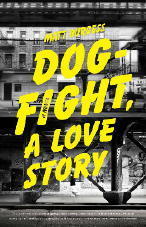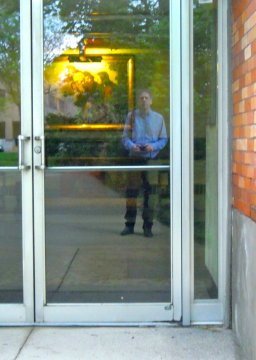Scott Sparling's Blog, page 3
March 11, 2012
New York, Sucker Lake, Michigan
Timing is everything. After months of working on the new book, I'm psyched to be hitting the road again for W2W, especially since the road is taking me to NY, Michigan, and my adopted hometown of Sucker Lake (which in a way, I guess, isn't really the road. But you know what I mean.)
As April begins, I'll be taking part in the butt-kicking Animal Farm Reading Series, which is held monthly at Public Assembly in Brooklyn. The reading organizers like to point out that all reading series are created equal, but some are more equal than others. In any case, I'm thrilled to have been invited. On April 3, I'll be reading with Bernice L. McFadden and Eliza Factor.
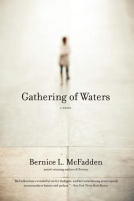
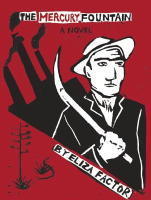
Gathering of Waters by Bernice L. McFadden & The Mercury Fountain by Eliza Factor.
A couple weeks later, I get to do the first W2W event in Lake Oswego, Oregon, which I sometimes call Sucker Lake to honor the lake's original name. (It was named after the fish, not for the people who fell for the advertising slogan "Live Where You Play" and built their mansions on its edge.)
I've lived in Lake O for twenty years, wrote most of W2W in the tree house here, and yet am best known for being the father of Zane Sparling, former prodigy/humor columnist for the Lake Oswego Review. (True story: A couple weeks ago I was mailing off a copy of W2W at the Lake Oswego post office, or the LOPO as some of us call it, when a stranger saw the book and asked if I was Scott Sparling. I was getting set to autograph her hoody when she told me how much she liked Zane's writing.) In any case, I'll be at the LO Public Library on April 17. Maybe I can convince Zane to come.
[image error]
A few nights later, on April 20, I'll join fellow Tin House writer Alexis Smith along with Jean Auel, Emily Chenoweth, Loren Christensen, Ted Coonfield, Kim Cooper Findling, April Henry, Bart King and Barbara Roberts at HomeWord Bound 2012, a fundraiser for Community Partners for Affordable Housing at the Tualatin Country Club in Tualatin, Oregon.
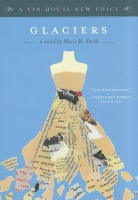
Glaciers by Alexis Smith
Then, Michigan. On April 28, I'll be in Lansing at the official Library of Michigan for an event that means a lot to me: Notable Nights, the Michigan book awards ceremony honoring the top Michigan books of 2011. It's an amazing thrill to be on the list along with Jim Harrison, Bonnie Jo Campbell, Michael Moore, Susan Whitall, Keith Taylor, Laura Kasischke, and more.
As part of the Notable Books program, I've been invited to read at the Shiawassee District Library in Owosso, Michigan, about an hour north of my biological hometown. I'll be there on April 30. Seger fans, stop by and we'll talk music, freight hopping, glue sniffing and anything else that's on your mind.
Later in June, I'll be back in Michigan again, including Detroit and a short tour of the Upper Peninsula. Can't wait for that either.
And to get ready for all this travel: the annual trip to SXSW in Austin later this week with the incomparable Ears Two, well known to Segerfile fans. I'm looking forward to four days of Jon Dee Graham, Chuck Prophet, Alejandro Escovedo, the Black Angels, Justin Townes Earle and dozens of other bands. I've already made Jon Dee Graham's "Laredo" the unofficial theme song of the next book (currently called AUX IN):
I drove home from Laredo, I had the fireflies in my head
They were lighting up a small, dark something.
They were circling round a small, dark something
They were looking for a small, dark something.
-- Jon Dee Graham
If you're in Brooklyn, Sucker Lake, Seger Nation or Austin, shoot me a tweet or an email, or come out and say hi. It'll be great to see you the road.
New York, Sucker Lake, Detroit
Timing is everything. After months of working on the new book, I'm psyched to be hitting the road again for W2W, especially since the road is taking me to NY, Detroit, and my adopted hometown of Sucker Lake (which in a way, I guess, isn't really the road. But you know what I mean.)
As April begins, I'll be taking part in the butt-kicking Animal Farm Reading Series, which is held monthly at Public Assembly in Brooklyn. The reading organizers like to point out that all reading series are created equal, but some are more equal than others. In any case, I'm thrilled to have been invited. On April 3, I'll be reading with Bernice L. McFadden and Eliza Factor.


Gathering of Waters by Bernice L. McFadden & The Mercury Fountain by Eliza Factor.
A couple weeks later, I get to do the first W2W event in Lake Oswego, Oregon, which I sometimes call Sucker Lake to honor the lake's original name. (It was named after the fish, not for the people who fell for the advertising slogan "Live Where You Play" and built their mansions on its edge.)
I've lived in Lake O for twenty years, wrote most of W2W in the tree house here, and yet am best known for being the father of Zane Sparling, former prodigy/humor columnist for the Lake Oswego Review. (True story: A couple weeks ago I was mailing off a copy of W2W at the Lake Oswego post office, or the LOPO as some of us call it, when a stranger saw the book and asked if I was Scott Sparling. I was getting set to autograph her hoody when she told me how much she liked Zane's writing.) In any case, I'll be at the LO Public Library on April 17. Maybe I can convince Zane to come.
[image error]
A few nights later, on April 20, I'll join fellow Tin House writer Alexis Smith along with Jean Auel, Emily Chenoweth, Loren Christensen, Ted Coonfield, Kim Cooper Findling, April Henry, Bart King and Barbara Roberts at HomeWord Bound 2012, a fundraiser for Community Partners for Affordable Housing at the Tualatin Country Club in Tualatin, Oregon.

Glaciers by Alexis Smith
Then, Michigan. On April 28, I'll be in Lansing at the official Library of Michigan for an event that means a lot to me: Notable Nights, the Michigan book awards ceremony honoring the top Michigan books of 2011. It's an amazing thrill to be on the list along with Jim Harrison, Bonnie Jo Campbell, Michael Moore, Susan Whitall, Keith Taylor, Laura Kasischke, and more.
As part of the Notable Books program, I've been invited to read at the Warren Civic Center Library in Warren, Michigan, about a half hour north of Detroit, the capital of Seger Nation. I can't wait – I'll be there on April 30. Seger fans, stop by and we'll talk music, freight hopping, glue sniffing and anything else that's on your mind.
Later in June, I'll be back in Michigan again, including a short tour of the Upper Peninsula. Can't wait for that either.
And to get ready for all this travel: the annual trip to SXSW in Austin later this week with the incomparable Ears Two, well known to Segerfile fans. I'm looking forward to four days of Jon Dee Graham, Chuck Prophet, Alejandro Escovedo, the Black Angels, Justin Townes Earle and dozens of other bands. I've already made Jon Dee Graham's "Laredo" the unofficial theme song of the next book (currently called AUX IN):
I drove home from Laredo, I had the fireflies in my head
They were lighting up a small, dark something.
They were circling round a small, dark something
They were looking for a small, dark something.
-- Jon Dee Graham
If you're in Brooklyn, Sucker Lake, Seger Nation or Austin, shoot me a tweet or an email, or come out and say hi. It'll be great to see you the road.
February 10, 2012
Fourteen Years and Rolling
Fourteen years ago – on February 11, 1998 – I launched the Seger File. I didn't know it at the time, but it was the beginning of one of the most fulfilling things I've ever done, all because of the people I've met and the friends I've made.
A few Seger File facts:
When I started, the site had very few graphics or images. I figured the information superhighway, as we called it back then, was all about information, not pictures. Also, my computer was way too slow to handle images well.
The site was launched on a dial-up Internet service – almost everything was dial-up back then. I built the site in Claris Home Page, doing most of the coding in the cafeteria of Sparrow Hospital in Lansing, Michigan. My mom was in the hospital recovering from a stroke, and I could only see her a few times a day for short periods. In between visits, I'd go back to the cafeteria and do more coding.
The site still runs on Claris Home Page, which only works on Mac OS 9. I keep an old laptop around to host the site. I do all the updates on a MacBook Air, then transfer them to the old laptop to upload.
On the day after I launched the site, there were four visitors. There was no Google at the time and so no Google analytics. I've had several different visit-counter/analytic programs over the years, some of which are no longer functional, so I don't really know how many people have visited the site in all. In the past five years, there have been 200,000 unique visitors.

A photo I took at the Primo Showbar in Ann Arbor in 1973. I gave it to Seger at the next show. He used it on the back of his next album.
I started the site because I was having trouble finishing my novel, Wire to Wire. I thought doing the site would provide a good little break, and then I'd go back to writing my book. In fact, the site was so much fun to work on, it probably slowed the novel down by five years or more. (Shameless pitch: Don't worry about buying the site a birthday present. But feel free to buy yourself a "smart, thrilling and darkly funny" book that's not really a crime novel, set in Michigan.)
I was tremendously fortunate to have started a site about Seger at a time when he had pretty much dropped out of sight. That meant that instead of reporting news, I had to create essays. Without a lot of information to rely on, I had to give the site a personality. It made me a better writer.
Want to know what's up with Seger these days? Do a Twitter search or set a Google alert. If you wanted to know what was up with Seger in 1998, there weren't many places to go. I'd hit the library, look through the microfiche and the out-of-town newspapers. If I found something, I'd make a photocopy, come home and re-enter the information. There were no other Seger sites back then, so for years the Seger File was the only online resource.
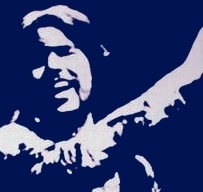
In 14 years, I can only remember four times when people have asked me to take things down from the site. One was a bad review of a video, a couple were photos, and one was when I posted some lyrics Seger hadn't released yet.
There was more sarcasm and humor in my writing during the early years. When Seger got inducted into the Hall of Fame and the Detroit Free Press called me for an interview, I realized a lot of people were reading the site, and I became a little less gonzo and a little more journalistic. When the BBC called for an interview, I knew the site was making an impact. And there's still plenty of sarcasm on the annual April Fools post.
You might imagine that over the years, a person running the Internet's largest Seger site would hear a lot of rumors and information that can't be posted. You'd be right.
I initially named the site "The Segerfile." Then I realized search engines weren't listing it when people searched for "Seger." So now I usually write "The Seger File." But I still like Segerfile better.
And the best thing about the site, by far – all of you. Thanks for all your encouragement and friendship over the years. As Seger says in one of my favorite lines, no one has to tell me I'm a lucky man, and it's your friendship that makes me feel that way.
________________
Bob Seger, the Tigers, America the Beautiful. For a lot of us, the second half started right here.
January 7, 2012
The Intentional Ducati Zine
It's either the coolest new zine in the already very cool PDX zine scene or one of the best collections of flash fiction you could find. Or both. Either way, you should get your hands on The Intentional Ducati, Issue 1: Tumburbu and The Entire Screaming World.
A Ducati in this context is more than a motorcycle. It's a creation of a group of writers who follow what I like to call, when I'm alone here in my room, the Pinewood Path—or in other words, writers who have worked with and learned from two extremely smart, generous, and amazing writing teachers, Stevan Allred and Joanna Rose, who lead the Pinewood Table writing group.
Here's how Stevan, who edited and produced the Ducati zine, explains it.
"Something remarkable happened early on in the life of the writing group that Joanna Rose and I have led since the mid-nineties: two writers came in with the word Ducati used in both their pieces. If they had both mentioned motorcycles we might have noticed, and had they both said Harley Davidson we would surely have remarked on it. But the specificity of Ducati, a relatively obscure brand of Italian motorcycle, seemed to push this coincidence into the wu-wu realm of the divinely synchronous. Ever since, whenever something like this happens in our writing group, we call it a Ducati."
Every so often, Steven and Joanna invite writers who work with them to create Ducatis on purpose. They provide a list of phrases or elements, and those of us who are up to the challenge write short pieces incorporating some or all of the elements. The resulting pieces of flash fiction are called Intentional Ducatis.

For me, writing these short pieces started as a playful exercise. Nothing serious—just a fun break from the burden of wrestling Wire to Wire onto the page.
But looking back, I see that the Ducatis I wrote followed the first good advice I got as a writer, which was: Don't work at writing—play with it the way a child would play with it.
That approach brings out some amazing writing. It doesn't mean the stories in Issue 1 aren't serious—many of them are. But it helps explain why they are all so good.
In the introduction to the zine, Stevan writes about the first time we gathered to share our Ducatis, several years ago.
"Trying to include those elements freed each of us from the writing ruts in our heads. The writing we heard that night was fresh, wonderfully varied, and wildly imaginative."
Last week, many of us who have been part of the Pinewood Table over the years joined Stevan and Joanna for a reading at the Blackbird Wine and Atomic Cheese Shop in Portland. Individually, the stories were terrific; hearing them back to back and noticing the subtle connections made the evening even more special. The event celebrated the launch of Issue 1, Tumburbu and The Entire Screaming World. Hopefully, there will be many more issues to come.
You can read many of the Intentional Ducatis online here. But you'll also want to hold the handsomely produced zine in your hands—if for no other reason than so you can wave it around ten years from now and let the world see the coolness that was Issue 1. To make that happen, email Stevan Allred here.
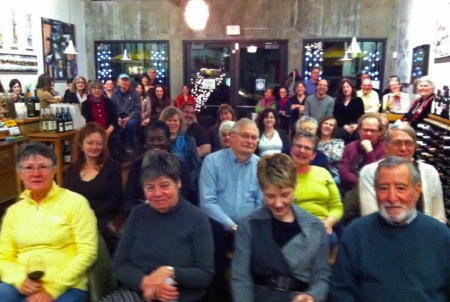
A packed house at Portland's Blackbird wine shop listens to Intentional Ducatis.
Thanks to Julia Stoops—writer, artist, and designer of websites (including this one)—for the photo.
____________
"D is for Dangerous" and also for Ducati and try to keep your trousers on: The Arctic Monkeys.
December 31, 2011
Land of Dreams
A long time ago, I set off by freight to see Northern Michigan and most of the western states, traveling with my good friend Jesse Burkhardt, and sometimes Tom Lacinski, and sometimes alone. This year, all of that traveling came full circle with the publication of Wire to Wire.
There are many, many people who helped along the way—way too many to name. I'm grateful to all and especially to all of you who have invited the world of Wire to Wire into your imagination and let it bloom there. Thanks, and here's to many good trips ahead.
— Scott
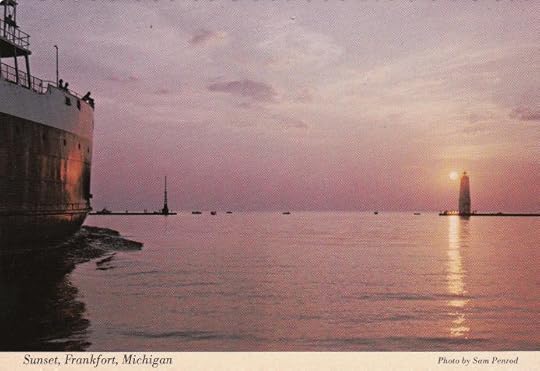
December 28, 2011
Wild In Minneapolis
One day in Minneapolis, when I didn't have anything else to do, I leapt from an overpass onto the top of a moving train. It was one of a few reckless things I used to do that didn't seem reckless at the time—the time being 1978 or so.
At night, for example, I used to walk out on the railroad bridge that crossed the Mississippi between Minneapolis and St. Paul. It was a long bridge, with two tracks and a raised metal ledge running the length of the span. The ledge was about as wide as a sidewalk and some nights I would stand on it and look at the blackness far below where I knew the river was. I never gave a thought to jumping—it wasn't about that. Just the opposite: I went out there to feel alive. And also, to be honest, because I didn't have many friends or a lot of other places to go.
This past October, I went back to Minneapolis to read at Magers & Quinn, a great indie bookstore on Hennepin Avenue, a few blocks from where I lived in the '70s. (Another wonderful bookstore in Minneapolis, btw, is Birchbark Books near Lake of the Isles. Birchbark is owned by Louise Erdrich and run by a very friendly, book-loving staff.)
Magers & Quinn had invited me to read with Matt Burgess, author of Dogfight, A Love Story. Matt's a great guy and his book is amazing—get your hands on it and prepare to inhale.
When the reading was over, Andy at M&Q told me about a place in town called the Hard Times Café. It was a vegan, cooperative café, he said, and also a gathering spot for people who still rode freight trains. The Hard Times happened to be across the way from a place that made prosthetic limbs, and Andy told me that you'd sometimes you'd see riders in the café wearing them. I knew I had to check the place out.
But first—around midnight, actually—I went back to the railroad bridge, intending to walk out over the Mississippi. To feel alive, of course, but also with the hope that the bridge might now extend backward into time. To the days when I used to sleep on the floor of the Minnesota Tenants Union, where I sometimes worked—back when $300 would get me through a whole summer of riding trains, with a little fruit-picking thrown in to tide me over. And back to the friends who took me in or let me go, like Cara and Patti and Kink, and Richard who let me ride in the caboose all the way to Mankato, and Flo, Kirk, Diana—hey, I guess I did have friends back then after all.
Before I could get to the bridge there was a fence that had to be jumped, and that much I still have in me. But past it, at the edge of the river, there was a second, much bigger fence, with barbed wire extensions. You used to walk out on this bridge, the fence said, but you aren't walking out no more.
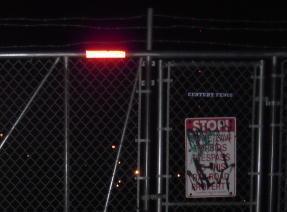
This second fence was a serious piece of work. I spent a long time trying, but the portal to the past remained closed. Afterward I spent an hour or so trying, more successfully, to open a portal at Palmer's Bar in the Cedar-Riverside neighborhood.
So it was that I ended up at the Hard Times Café after 2 a.m. on a Thursday night in October. The place was still open—til 4:00 a.m. said the girl behind the counter, who had eyes so much like cats-eye marbles I never wanted to look away.
There were no freight riders around that I could see, but everyone in the place had a glow of some kind; a strange middle-of-the-night energy of people who were vegans, or students, or involved in romances that were ending or beginning or fouled up in ways that kept them from going home. I didn't know. But I knew I wanted to be there just to bask in whatever it was.
I also wanted to abandon/release a copy of Wire to Wire there. So I left behind WILD W2W-003, one of four copies that are running around loose in the world. There's a message from me on the inside, asking those who find the book to get in touch if they like.
[image error]
In November, I got this message:
SCOTT: I am currently reading one of the "wild" copies of your novel Wire to Wire, which I found in the free bin of the Hard Times Cafe in Minneapolis where I work. I like it so far; your writing reminds me a little of Brett Easton Ellis or maybe a less snarky Chuck Palahniuk. I'm glad I decided to give it a go, man....will probably just return it to the free bin when I'm done or give it to someone else. Cheers-DOUG SARETSKY
I wrote Doug back, telling him what I'd heard about Hard Times being a mecca for people hopping freights—which didn't really mesh with what I'd seen in late October. He replied:
"Man, Hard Times is trainhopper central in the spring and summer—some of 'em are kind of cool and some of 'em are just drunk kids."
I should have known that, of course. Spring is when I used to quit whatever job I had so I could go back out on the road. So it looks like I'll have to return to the Twin Cities next year. I want to meet these kids who are still riding the rails.
In the meantime, the other three wild copies of W2W are still out there. If you come across one, let me know.
______________________
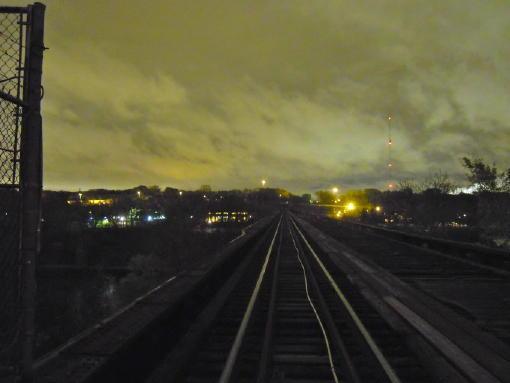
A bridge to the past. "Because some things in life are still worth a good brawl." Jesse Sykes and the Sweet Hereafter, "Tell the Boys."
The story of how I jumped from the overpass onto a moving freight is here.
December 1, 2011
Ten Reasons
Can you withstand all ten reasons to buy Wire to Wire? Test your willpower. I'll add a new reason every day until you head down to the freight yard or fall in love with a woman who sniffs glue. But it would be easier (and more enjoyable) if you just bought the book.
Reason #1: Rose.
Part-time dispatcher for the county sheriff, a gay woman in a small town, able to see through all bullshit. Calls Slater and Harp "the two penises." Verbally, she's the only character who is a match for Charlie. Rose sometimes criticizes Lane, but it's because she loves her.
"And then there's Lane," Rose said. "She's a sexual dyslexic. First the fucking, then the flirting. But that's why we love her, right? She drinks straight from the blender."
Rose is also the only character with a halfway decent handle on love and sex. "Just remember," she tells Slater. "If you can't hear the angels sing when you make love, you're not doing it right."
Bonus reason: W2W is the only book published this year containing a two-word sentence consisting of the same word twice, used first as a noun, then as a verb. Page 194. Thank you, Tin House, for not editing that out.
________
What Rose might play after pouring Lane a glass of wine, if only the two penises weren't around: "Baby I'm Yours," by Barbara Lewis.
________
Reason #2: Trains
Wire to Wire is not primarily a train book. There's more going on than that. If you want to read a book that's thoroughly and totally about trains, stop by the house and I'll dig out the first draft. (Actually, don't. Just being rhetorical.)
Still, trains run deeply through W2W—mainly because trains ran through my life when I was growing up. The Penn Central tracks were behind our house in southern Michigan. And my close friend Jesse Burkhardt—later known as Iron Legs Burk—was fascinated by trains. He taught me how to jump them and got us out there on the road. In the years after high school and college, we traveled all across the country by freight.
Those trips later inspired a short story, "New Time," which eventually led to Wire to Wire. Here's an excerpt from the story, describing two riders waiting for a hotshot freight they call The Nowhere Special.
"Any train with hoses hooked and fresh orders we rode. Out of Regina, the ride was tame and ordinary, but it wouldn't stay that way…It would come, The Nowhere Special, in its own rotation with the unit trains, the one-a-days, the turnarounds, the slugs, and we would grab its grabirons when it did."
Wire to Wire starts in a freight yard in Detroit and ends with crossing bells ringing. The freedom, thrill, and perils of riding freight—all the things I tested myself against, all the things that lit up my younger life—are threaded through the pages of W2W. If the book is an homage to anything, it's an homage to that.
Bonus reason: When Iron Legs and I were riding, we'd write our freight names on the side of boxcars. Mine appears on p. 175.

An early map: The cross-hatched lines are freight trips I took, alone or with Jesse.
[image error]
Long before Tin House bought the manuscript, I mocked this up—as a joke, mostly, but partly to visualize W2W as a book.
_______
Baby you and I are not the same. (You Better) "Catch Yer Own Train." The Silver Seas.
_______
Reason #3: The 1970s
Wire to Wire is set in a strange and distant time before cellphones, texting, Google, Facebook, rappers, yuppies, CDs, Fox News, and blogging. The Michigan portion takes place in 1978. The frame story in Slater's New York video editing suite is set in1981.
Harp and Slater and Lane were off the grid in the 70s and early 80s, because for most of us, there was no grid. When you were alone in 1978, you were really alone. We had no iPods, no mp3s, no video games. We only had each other, and often we didn't have that.
Trains still ran with cabooses in those days, the Ann Arbor railroad ferries crossed Lake Michigan daily, and you could buy a beat-up Ford Ranchero for well under a thousand dollars. Detroit was a city of 1.2 million. Cars were made mostly of metal. Books and records were sold only in stores.

A 1967 Ford Ranchero. (Photo credit: Wikipedia/Bill Wrigley)
_______
Writing in HTMLGiant, the author Joyce Thompson says this about Wire to Wire:
"It took so long for Sparling to find a publisher that this near perfect novel has become historical along the way, an elegy for the relatively innocent 1980s, before the American Midwest became the home of exploding meth labs and McDonald's-induced obesity, before ubiquitous digital technology made it impossible to truly be alone. So many of our best stories would never have happened if all their characters had iPhones in their pockets. Don't miss this trip into the recent and unreclaimable national past."
[image error]
The City of Green Bay on the Big Lake
_______
[image error]
Bonus reason: In the manuscript, Lane mocked one of the era's most common advertising slogans—"Come to where the flavor is"—by using it as come-on for oral sex. To readers who didn't get the reference, the line sounded crude. In fact, she was simply commenting on the obvious sexual and homoerotic undertones of Marlboro's ad—they've got the lasso circling the cowboy's crotch, for chrissakes, and this is pre-Photoshop. Some late-Mad Men-era graphic artist had to spend hours with an airbrush making that work.
Alas, Lane's socio-political critique was lost on younger readers, so I replaced the Marlboro line with a quote from Seger's "Heavy Music." (Page 224. The Marlboro line turns up on a billboard later in the story.)
__________________________________________
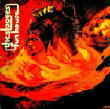
Out of my mind on a Saturday night: The Stooges, "1970." If you don't feel alright by the time the sax comes, you never will.
_______
Reason #4 Preview: Sex
To be continued...
Five Reasons
Can you withstand all ten reasons to buy Wire to Wire? Test your willpower. I'll add a new reason every day until you head down to the freight yard or fall in love with a woman who sniffs glue. But it would be easier (and more enjoyable) if you just bought the book.
Reason #1: Rose.
Part-time dispatcher for the county sheriff, a gay woman in a small town, able to see through all bullshit. Calls Slater and Harp "the two penises." Verbally, she's the only character who is a match for Charlie. Rose sometimes criticizes Lane, but it's because she loves her.
"And then there's Lane," Rose said. "She's a sexual dyslexic. First the fucking, then the flirting. But that's why we love her, right? She drinks straight from the blender."
Rose is also the only character with a halfway decent handle on love and sex. "Just remember," she tells Slater. "If you can't hear the angels sing when you make love, you're not doing it right."
Bonus reason: W2W is the only book published this year containing a two-word sentence consisting of the same word twice, used first as a noun, then as a verb. Page 194. Thank you, Tin House, for not editing that out.
________
What Rose might play after pouring Lane a glass of wine, if only the two penises weren't around: "Baby I'm Yours," by Barbara Lewis.
________
Reason #2: Trains
Wire to Wire is not primarily a train book. There's more going on than that. If you want to read a book that's thoroughly and totally about trains, stop by the house and I'll dig out the first draft. (Actually, don't. Just being rhetorical.)
Still, trains run deeply through W2W—mainly because trains ran through my life when I was growing up. The Penn Central tracks were behind our house in southern Michigan. And my close friend Jesse Burkhardt—later known as Iron Legs Burk—was fascinated by trains. He taught me how to jump them and got us out there on the road. In the years after high school and college, we traveled all across the country by freight.
Those trips later inspired a short story, "New Time," which eventually led to Wire to Wire. Here's an excerpt from the story, describing two riders waiting for a hotshot freight they call The Nowhere Special.
"Any train with hoses hooked and fresh orders we rode. Out of Regina, the ride was tame and ordinary, but it wouldn't stay that way…It would come, The Nowhere Special, in its own rotation with the unit trains, the one-a-days, the turnarounds, the slugs, and we would grab its grabirons when it did."
Wire to Wire starts in a freight yard in Detroit and ends with crossing bells ringing. The freedom, thrill, and perils of riding freight—all the things I tested myself against, all the things that lit up my younger life—are threaded through the pages of W2W. If the book is an homage to anything, it's an homage to that.
Bonus reason: When Iron Legs and I were riding, we'd write our freight names on the side of boxcars. Mine appears on p. 175.

An early map: The cross-hatched lines are freight trips I took, alone or with Jesse.
_______
Baby you and I are not the same. (You Better) "Catch Yer Own Train." The Silver Seas.
_______
Reason #3: The 1970s
Wire to Wire is set in a strange and distant time before cellphones, texting, Google, Facebook, rappers, yuppies, CDs, Fox News, and blogging. The Michigan portion takes place in 1978. The frame story in Slater's New York video editing suite is set in1981.
Harp and Slater and Lane were off the grid in the 70s and early 80s, because for most of us, there was no grid. When you were alone in 1978, you were really alone. We had no iPods, no mp3s, no video games. We only had each other, and often we didn't have that.
Trains still ran with cabooses in those days, the Ann Arbor railroad ferries crossed Lake Michigan daily, and you could buy a beat-up Ford Ranchero for well under a thousand dollars. Detroit was a city of 1.2 million. Cars were made mostly of metal. Books and records were sold only in stores.

A 1967 Ford Ranchero. (Photo credit: Wikipedia/Bill Wrigley)
_______
Writing in HTMLGiant, the author Joyce Thompson says this about Wire to Wire:
"It took so long for Sparling to find a publisher that this near perfect novel has become historical along the way, an elegy for the relatively innocent 1980s, before the American Midwest became the home of exploding meth labs and McDonald's-induced obesity, before ubiquitous digital technology made it impossible to truly be alone. So many of our best stories would never have happened if all their characters had iPhones in their pockets. Don't miss this trip into the recent and unreclaimable national past."
_______
Out of my mind on a Saturday night: The Stooges, "1970." If you don't feel alright by the time the sax comes, you never will.
_______
Reason #4: Sex
When Michael Slater returns to Wolverine, Michigan, he finds himself torn between two worlds. Harp's realm is the freight yard and the trains that carry him through the night. Lane inhabits a world of sex—of nights and boundaries soaked in epoxy fumes. The longer Slater stays in Michigan, the more he is caught between those two forces.
Watching images of his past on video monitors three years later, the unsolvable dichotomy is laid out for him again:
"Harp showed Slater all the secrets of the rails—which trains to ride, which cars to jump, and how a fast freight could blow the lines right off the calendar and change your sense of time. But it was Lane who told Michael Slater to start with yes."

Long before I discovered the structure of Wire to Wire, I knew I wanted to write as powerfully as I could about freight trains: what it feels like to hop them, how they sound up close or inside a car, how big they are. During the freight scenes, I wanted the rhythm of the language to sound like trains.
Since I was going all out with freights, I decided I had to go full strength on Lane's side as well, on the sexual attraction she holds for Slater. Early on, I had come across the word "isacoustic"—actually, I learned it from one of those word-a-day calendars—and because Slater is a video editor, I thought he might know the word. It means two sounds of equal intensity. In Wire to Wire, freights and sex are meant to be isacoustic.
That said, while the sex scenes to my eye are vivid and hopefully powerful, I don't think they're over the top. I admit to a brief period of retrenchment when I did a lot of word-searches and editing in order to make a PG-rated version of the manuscript. I honestly don't know what I was thinking at the time. I probably still have that version around here somewhere —stop by the house and I'll dig it out. (Actually, don't. Joking again.) Anyway, the PG version didn't work. It upset the balance.
So sex is on the page in Wire to Wire, usually in a scrabbled mess of dark and light, in a tangle of scarves and limbs—and it's both good and bad, in the way that anything powerful can be bad when it gets out of control.
Meanwhile, I keep waiting for some community-minded folks down the road from Sucker Lake to propose banning the book. I wouldn't mind a little notoriety, but so far I've had no such luck. Nor did I get invited to speak on the Wordstock Sex Panel, as you already know from my previous post, Sex and Commas. (If you read it again, pay close attention to the seething indignation just under the light, humorous tone.) There are also various "Best Literary Sex Scenes" lists that never seem to include W2W, probably because the listmakers haven't read Wire to Wire, or have never had sex.
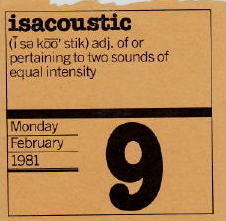
________
For the night it all goes wrong, and you end up driving to the station in the pouring rain: Randy Newman, "Bad News from Home."
________
Reason #5: It's not a crime novel.
There. I said it.
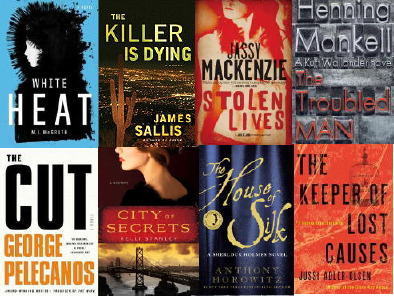
Crime novels.
[image error]
Not a crime novel.
____________________________________________________
November 20, 2011
Book Friday
Despite what you may have heard from various small-minded people in my past, I am not the one who ruined Christmas. But I do know how to save it.
First, about these vicious rumors, let me say that I've always been a stalwart supporter of Christmas and Hanukkah and any other holiday you might choose to celebrate this time of year. True, we usually order take-out on December 25, but from the good Chinese place, not the much cheaper but bad Chinese place we order from on other days. But if there's no turkey on our dining room table during the holidays, it's not because we hate Christmas. It's because we have no dining room table—a situation related to the fact that we also have no dining room. That's how we roll in Sucker Lake.
Possibly, you once had us over for dinner, and now several years or perhaps a couple decades later, you're still wondering why we didn't reciprocate. The answer's simple. It's because no matter how good a friend/cook/host you are, it's not worth a $25,000 addition to our house just to have a place to set a table we don't own with china we don't have and food we don't know how to cook. Hey, maybe you're one of the 3.2 million adults in the US between the ages of 18 and 54 who suffer from agoraphobia (thanks, Wikipedia!)and while you love giving dinner parties, you dread being invited to them. Check us out—we're the perfect guests! Feed us, and you'll never hear from us again.
So anyway, Christmas dinner here is out. Not happening. Ditto chestnuts roasting in the fireplace—we fear fire so much, we're actually having our fireplace torn down, resale value be damned. Ixnay as well on gathering around the hearth, unless hearth has become a synonym for my laptop computer, in which case feel free to gather 'round as I watch The Walking Dead, if that's what turns you on.
We also don't do carols, send cards, or put reindeer in the yard, though if I could find a lifelike ceramic coyote chewing the leg off a lifelike reindeer, I'd be tempted, except for the possibility of attracting real coyotes. I've got enough tricksters in my life.
We do, however, put up lights. Every year, in festive three-foot-high letters, we spell out the word EAT on the front of our house. It is our cheery holiday message to the world.
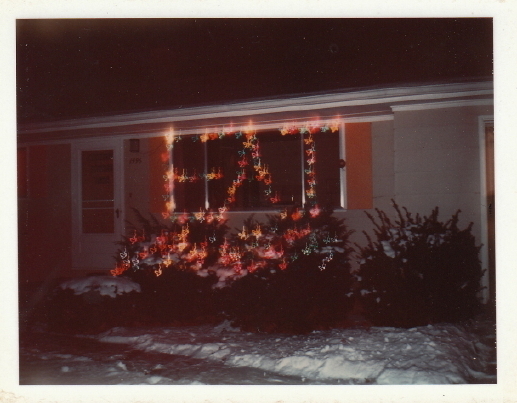
Christmas in the '70s
______________________
This tradition dates back to the early 1970s, which coincidentally is also when the accusations about me spoiling Christmas began. (I say coincidentally because the complaints originated from my classmates on the high school paper who had never seen my Christmas lights. Several of these Goody Two-Shoe types—who were studying journalism, for chrissakes—were incensed over a different example of the free expression of ideas. Specifically, they were pissed because I had exacto-knifed the word "happy" out of the huge wreath graphic we were running on the front page and replaced it with the word "funky." Believe it or not, some of my classmates were so whitebread, they had never heard the word before and thus had no idea what a "Funky New Year" might be. But they knew it meant something bad, since anything you don't understand is pure evil, right? Suffice it to say, the year that followed was not filled with funk for these charming young puritans, though that was hardly my fault, and these many decades later, I still bristle at the charge, gravely presented to our faculty advisor, that I somehow ruined their Christmas.)
(True, I also had a color poster in my peachy that I liked to flash around showing a dead or dying Santa Clause in a muddy Vietnamese rice paddy. My funkless classmates found the image offensive. But that wasn't me ruining Christmas. That was the Vietnam War was ruining Christmas. I just had a picture of it.)
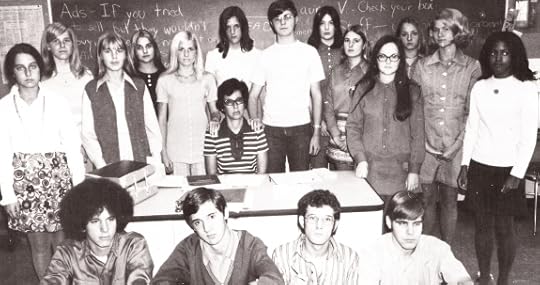
Ruining Christmas for the newspaper staff.
______________________
But back to the lights. In case you were born too late and missed all the good stuff, in the '70s our outdoor lights were composed of these big freakin' bulbs that, if you saw one today, would remind you of the shape and size of a butt plug. I say "you" and not "me" because I would never think that, especially around the holidays. But if you're reading this blog—and we both know you are—it's safe to say you harbor interests that are considerably less wholesome than, say, my former high school classmates. (Feel free to do your own comparative research on old time Christmas lights and anal sex toys at etsy and thisnext.)
Anyway, the bulbs were big, and each one used as much energy as a Prius. Another great thing about Christmases past is that we didn't worry about energy back then. We had plenty, possibly because you and all your friends weren't born yet. Not that I want to ruin your Christmas, but you've got a lot to account for, young people of the world.
This particular Christmas, I asked my parents if I could be in charge of putting up the lights, a job that was normally handled by my dad. My parents were already aware of signs of social rebelliousness in my teenage persona. Years earlier, as an 11-year-old, I had wanted to put up a yard sign that said: "Barry Goldwater: The fascist gun in the west." I didn't know what fascist meant at that young age, but I knew it had to be pure evil. (cf. "funky," above.) My Ramparts-reading father was no Goldwater fan, but our neighbors probably were, so the answer was no. (Years later, I learned that my mother had argued yes, assuming I wouldn't have had the follow-through to actually make such a sign. She was probably right.)
Naturally, when the 70s rolled around and the Vietnam War escalated, I began shaving a peace symbol in our front yard with the mower. Backstory: Saturdays in our house began at the insanely early hour of 10 a.m., when my father would enter my room unbidden and ask a) if I was ever getting up and b) if I had any plans for the day. The second query was a trick question. I was a teenager. It was the dawning of the Age of Aquarius. Ipso facto, I had no plans. No one I knew had plans. I didn't start making plans, in fact, until Reagan's second term, and then they involved paying off one credit card with another to avoid having to find a job and get up early. The consequence of this self-inflicted Ponzi scheme is that I went deeply in debt and was forced to become the employed person I am today; the consequence of having no plans on a Saturday in the 1970s was being force-pressed into mowing the lawn. I did so grudgingly, and when I was done I adjusted the blade to its lowest setting and mowed a gigantic peace symbol in the yard. We lived on a dead-end street, so my parents let it go. They also agreed with me. We Sparlings were liberals in a nest of conservatives.
So when I positioned my parents at the end of the driveway one night many years ago, after a cold afternoon of hammering and adjusting a string of butt-plug shaped lights, I knew they expected social commentary. Perhaps another peace symbol. Maybe something pithy like END THE WAR. Instead, what they got was EAT.
[image error]
Christmas in the '90s.
______________________
EAT. It's what you do over the holidays. More to the point, it's what I was forced to do at holiday gatherings I didn't wish to attend. According to the as-yet-unrecognized but nevertheless virulent reverse sexism and ageism of the day, I—a male and a teenager—was expected to eat a lot, whether I wanted to or not. Seconds were required. Thirds were expected. The implicit social contract was this: If you don't ask for more food, it's because you don't love me. My grandmother never actually said this, but it was in the air. And in the squash and sweet potatoes. Also, she wasn't really my grandmother. My appetite, my clip-on tie, the bloodline—all phony. Didn't matter. You had to eat.
Shit. I live in a house with no dining room and I just now figured out why. (Thanks for nothing, assorted therapists.)
Anyway, my parents let me keep the lights up and we turned them on every evening. One night during dinner, a neighbor called. She lived two streets over but could see our lights across a couple vacant lots. Like all adults I knew back then, she was too polite to say what she really meant, but too artless to disguise it very well.
Did you know, she asked my mom, who had picked up the phone, that from here, through the trees and all, your Christmas lights almost look like they spell out the word EAT?
My goodness, my mom replied. Isn't that something! No, she had no idea.
After she got off the phone, we spent the rest of the meal looking at our neighbors' lights across the vacant lots and having polite, imaginary phone conversations with her. Did you know that, from here, your lights look like a horse's ass? No? Isn't that something!
______________________
Skip forward twenty-five years. My father, dead of Parkinson's and depression. My mother, slowly recovering from a stroke. More than 2,000 miles between the family home in Michigan and Portland, Oregon, where my sister and I have relocated. Just the three of us were left, and my mom couldn't live alone. We had to move her out here. She didn't want to come.
And so it happened that, one December at the end of the century, with the Age of Aquarius long since dead and buried, I stood again at the end of a driveway with my mother. This time, here in Sucker Lake. Once again, I had a surprise for her. I gave the signal and my son turned on the lights. EAT, they said, albeit in smaller, more energy-efficient bulbs. I did it for her, a surprise for old time's sake to help make her feel at home. She got a kick out of it. We all did. The next Christmas she passed away.
______________________
But the EAT sign continues. It's a Sparling tradition now and I think it will last a long time. I live, once again, on a dead-end street, and to be honest, I haven't gotten as many comments as I'd hoped. People are used to crazy shit these days. The only really good complaint I got came from an elderly neighbor who said, no lie, that I was ruining her Christmas. It was heartening, knowing someone was out there, paying attention. In the world of guerilla social commentary, it's stuff like that that keeps ya' going. Once and a while, for the sheer hell of it, I'll throw the lights up on the Fourth of July to try to ruin Independence Day. EAT is my primal, elemental message to all who pass by. If I had a bigger house and more bulbs, I'd add, "for tomorrow we may DIE." That would freak some people out.

The treehouse near Sucker Lake. You can never have too many EAT signs.
______________________
Yet the message is not really about food anymore. Never was. It's about consumerism. Some of us liberals worried that Christmas was becoming a celebration of consumption way back in the '70s. Ha! What amateurs we were then, compared to the gargantuan maw of consumption that is Christmas today. The holidays might mean various things to you, but one thing they are indisputably and ferociously about is consumption. EAT equals CONSUME equals BUY.
Looked at that way, my sign isn't outside the spirit of Christmas at all; to the contrary, it embodies the spirit of consumerism like no other word can.
So go on, go for it. On the day after Thanksgiving, go out and buy anything you want…just as long as it's a book. That's how we're saving Christmas this year. Forget Black Friday. It's Book Friday now.
And by go out, I mean to a physical bookstore with a real bookseller inside. From what I've heard, last Christmas was tough for some independent bookstores. Chances are, your favorite record store is already gone. If your favorite bookstore is still open, use the power of your holiday spending to help keep it that way. Go out on Book Friday and buy books for everyone.
Trust me, there's no occasion when a book wouldn't be better than the outrageous holiday crap you were planning to buy (like this thing.) Do you really need another holiday sweater/camera/butt plug? How about a book about said sweater/camera/butt plug? How about a book about books?
Or let's say I invite you over to the house for a holiday dinner (which I won't, but hypothetically). Don't show up with a bottle of wine or flowers as your gift. Bring me a book.
Similarly, don't give the parking lot guy $40 bucks in an envelope as recompense for only mildly dinging your car this year. Give him $40 bucks and a book.
You get the drill, right? Do not send flowers, candy, or fruit to distant relatives. Starbucks and iTunes cards are the mark of the devil. Find humans who don't read, and give them novels and poetry. The gods will salute you. Rich people, instead of buying your hubby or wife a $50,000 SUV Hummer, buy him/her $50,000 worth of books. Don't wrap them.
But which books, you wonder? Well, the one I wrote would be a fine choice. But so would any other. How about one of the National Book Award winners, or all of them? How about the equally fine or finer books unrecognized by awards? Perhaps you could find a website that recommends good books. There must be one somewhere.
They do have to be real books, however. With physical pages and covers. That's what Book Friday is all about.
______________________
How many books should you buy on Book Friday? Simple. Just take your weight, divide by the prime number closest to your hat size, and multiple by the speed of a bus traveling from Baltimore to Poughkeepsie. Knowing you, that's probably three or four.
Also, I know you like sitting at your computer and sending money to far-away places, listening into the ether for the efficient whir of gears as robots robo-pack your purchases. That's not gonna cut it this year. No sexy UPS guy with a package from Amazon is gonna get us out of the mess we're in. The bottom line is this: Independent bookstores are good for our communities and good for America...and the world, come to think of it. Basically, if you don't support your local booksellers, you'll be ruining more than Christmas. You'll be ruining the future. And you wouldn't want that rumor to get around.
So head out to your favorite bookstores on Book Friday, and stock up. I'll be out there with you. Do it for the local economy, for the people you love, for me, for my mom, or for yourself.
And have a funky new year.
______________________
October 16, 2011
Occupy Wolverine
When I was seventeen, I did something that still makes me proud when I think of it today. Nixon was in his first term back then. Protests against the Vietnam War were spreading across the country, but Jackson, the small Michigan town where I lived, remained untouched by the demonstrations. The town had always been a cold-bed of conservatism, as my dad used to say. It was also the birthplace of the Republican Party. The KKK and the John Birch Society, which believed Eisenhower was a communist stooge, were active in Jackson as well.
But of course, it was the 60s, and things were changing. Even in Jackson, there were many of us who did not support the war. That included my high school friend, Phil Anderson. Together, Phil and I decided to do something about how we felt, and so we founded the Jackson Moratorium Coalition.
My family had already traveled to Washington D.C. to take part in the national moratorium in October 1969. Ann Arbor – thirty miles east of Jackson – was home to the SDS and numerous protests. The good town of Jackson, however, did not look favorably on dissent, or any type of nonconformity, for that matter.
A small example: my father was a Realtor and had a reputation for honesty, established over many decades. That reputation allowed him to secure a bank loan with a handshake. But when he grew a beard in the late 60s and chaired the Open Housing committee to prevent redlining, one of the three banks refused to do any further business with him.
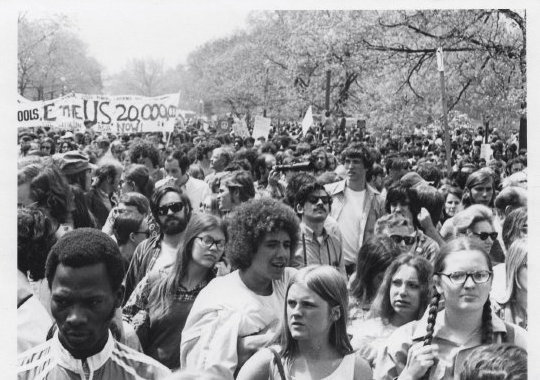
The Vietnam Moratorium march in Washington, D.C., October 15, 1969.
___
Against that unwelcoming backdrop, Phil and I set about organizing the Jackson Moratorium Coalition, deciding to hold a reading of the war dead. It would be the first major demonstration against the war our town had seen. More than 40,000 US soldiers had died in the war by that point and we intended to read every single name. We got a list from the national moratorium organization. We ordered buttons and printed up bumperstickers. I quit marching band so I'd have time to help organize.
For a couple weeks, we went from church to church, looking for a place to hold our reading. Predictably, they all turned us down. Except one: the First Congregational Church, prominently located downtown with a park-like courtyard by the main entrance, granted us permission. I didn't realize it at the time, but in retrospect I see that it was the most visible location we could have chosen.
The church's reverend – Robert M. Rymph – supported the president and the war. But he met with us, and in the end he agreed to let us use entranceway and courtyard because, as he told his congregation the following Sunday, "I was convinced they were very highly idealistic and sincere in their point of view. They recognize war as dirty business and conclude that it would be far better if the killing and war would cease. They want their lives to count for something big, something worthwhile. The fact that you and I might think they are naïve in what brings peace, or is necessary for peace, does not eliminate the conviction that they now hold." I had no idea how brave a decision Rev. Rymph was making, until much later.
The reading itself would take 32 hours. Phil and I recruited volunteers (included Laurie Kaufman, whom Phil would later marry, and Marty Kaser, my girlfriend for a while) but as the event neared, it became clear that our "coalition" would be small. Many parents forbid their kids from taking part.

The First Congregational Church of Jackson, site of the reading of the war dead.
___
Then, the day before we began, the newspaper in town – the Jackson Citizen-Patriot – ran an inflammatory front-page story about the event, characterizing it in the worst possible terms. This was before talk radio, but Jackson didn't need Glenn Beck to tell them what was right and what was wrong. The Cit-Pat, as everyone called it without the slightest trace of irony, served the purpose.
"It didn't require much imagination," Reverend Rymph said later, "to believe that the most swinging slumber party ever held in the city of Jackson was going to take place on Friday night right here in the First Congregational Church of Jackson."
An emergency board of trustees meeting was called on the morning of the reading. After "agonizing consideration" the trustees voted to support Reverend Rymph and allow the reading to go forward. I understood later that it wasn't just a vote about our protest – it was a decision about whether Reverend Rymph would keep his job. What's clear about Reverend Rymph in my memory is that he was a leader, not afraid of his convictions, and he prevailed.
To be clear, he disagreed with us about the war. But he believed that the spirit which motivated us was precious, something to be respected and in fact, nourished.
That Friday night after school – in the cold Michigan winter – Phil and I and a few others set up a single microphone stand and an amp in the doorway of the church. A handful of us stayed all night, reading all 40,000 names, minus the soldiers from Jackson. Many families in Jackson had asked that their sons' names not be included, so whenever we came to a deceased soldier from Jackson, we omitted his name.
When it was over, we were exhausted. But the event, from our point, was a tremendous success. We brought the war home to Jackson. We read the names. We stayed awake all night and all the next day. Though it was November in Michigan, we didn't freeze. Despite the intrusion of a few drunks, the event was peaceful.
Did it stop the war? Did it, together with hundreds of similar readings across the country, contribute in some small way to the momentum that eventually brought our troops home? Maybe, but if so, the effect on national affairs was miniscule, much too small to be measured.
This summer, while reading Wire to Wire in Michigan, I returned to the site of the war reading. To see myself again, as the Seger lyric goes.
___
The effect on me was large, though – large enough to still move me decades later. What impresses me most now is the strength and commitment of a man I hardly knew, Reverend Rymph. I wasn't a member of his church. I never heard him preach, though I knew he continued to support the war that I opposed. But I see now that his belief in a better future was as strong as ours.
He ended his sermon, the Sunday after our reading, with a statement of faith in young people, and by saying he wished he'd gotten to know us better. All these years later, I feel the exactly the same way about him.
__________
This week, I was proud to be able to join with more than two hundred other writers in supporting the Occupy Wall Street and the Occupy Movement worldwide. The statement of support, at occupywriters.com, has been signed by Salman Rushdie, Jonathan Lethem, Jennifer Egan, Michael Cunningham, Gloria Steinem and many more. The effort was organized by author and journalist Jeff Sharlet and journalist Kiera Feldman and supported by the editors of Tin House, among many others.
In conversations I've had this week, I've heard as many concerns and disagreements about the Occupy Movement as I did about our reading of the war dead. Are the tactics right? What are the goals? Will it accomplish something or just invite backlash?
But the bigger issue is this: our current economic system rewards greed. Short-term shareholder gain trumps everything. The disparity between the richest and the rest of us has never been greater, and the value created by this system has never been more ephemeral.
Corporate wealth and the general prosperity used to be linked – or at least we used to perceive they were linked. Healthy businesses provided jobs and benefits. Now we perceive an inverse relationship. Lay off workers or cancel retirement benefits and share prices rise. Corporations and CEOs perpetuate the inequities simply by playing by the rules and making logical decisions – because the rules and logic are rigged against most of us.
Is it any wonder we've fallen in love, lately, with stories about robots attacking their creators? The metaphor is obvious: we created corporations and now they rule us.
People can argue details and degrees, but the discontent is clearly widespread and why wouldn't it be? The greed that drives too much of Wall Street nearly wrecked the economy and we continue to pay for the repairs – during a jobless recovery to boot.
The Occupy Movement, like the antiwar movement, has a chance to be a prism for that discontent and to focus it where it might do some good. Forget goals, tactics, and disputes about the rules for public spaces for a while; the Occupy Movement is a huge sign that the water temperature has changed, is changing. And that alone is good, and it's why I was proud to add my name.
__________
In my blog post on Powells.com, Burning Down the House, I wrote that there's nothing intrinsically wrong with money and sex. Both forces make our lives more comfortable – more delicious – when they're under control. But like the forces of fire and water, when they jump their channels, they flood us out or burn the place down. To those who have complained that Wire to Wire is too raw, too much about lowlifes, I point to the sex- and money-scandal of the week. What's going on in Wolverine is nothing compared to the financial and sexual misconduct we see in Washington and Wall Street. Cue Bernie Madoff and Representative Wiener.
But it's deeper than that. The scandal of the week is just about headlines, and the focus is always on a particular miscreant. – a good man, maybe, who grasped for too much, etc. etc. That misses the point. There might be bad guys on Wall Street, but the problem isn't the players. It's that the game is rigged.
In 1968, a year before Phil and I and others read the names of the dead in Jackson, I heard a song that shaped my thinking – not just on the war but on that issue of having your life count for something.
The song is 2+2=? by Bob Seger. It still means a lot to me. You can listen to it on the music page of this site, and I recommend you do. In it, Seger sings, "It's the rules, not the soldiers, that are my real enemy."
From Vietnam to Wall Street, it's a line that still rings true.
__________
Harp Maitland is a loner type – I'm not entirely sure he'd join a protest. But if there were protesters in Wolverine, the fictional town of Wire to Wire, he'd definitely be on their side.
Here's Harp, as he returns to Wolverine from one of his freight trips, walking through the abandoned freight yard that he loves, which is slated to become the site of some new condominiums.
The [caboose] now looked out onto the half-built frame of the Whispering Sands. The work of downstate investors, men who didn't give a slippery shit about anything, as long as their return on investment was high.
It was pretty clear how things were going, he thought. What used to be the world was becoming the marketplace. Anyone could see it wasn't square…
In the old days, the land behind the Sawhorse ran to weeds and rusty rails all the way to Wolverine Bay. The emptiness was part of the town and seemed to be fine with everyone. But then money took over, and money didn't like emptiness. The land behind the Sawhorse wasn't earning any income, and that attracted bulldozers.
Someday when it's too late, Harp thought, we'll all be sorry we didn't tell money to go to hell.
My take on the Occupy Movement is that it's not too late. In fact, it's time to start.
__________
[image error]
Think it's time we got together and declared. The Bob Seger System, "Highway Child." Play it loud.

